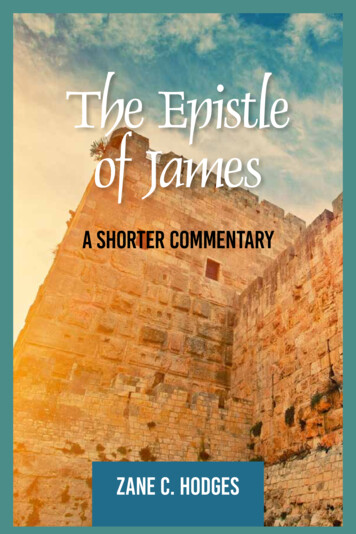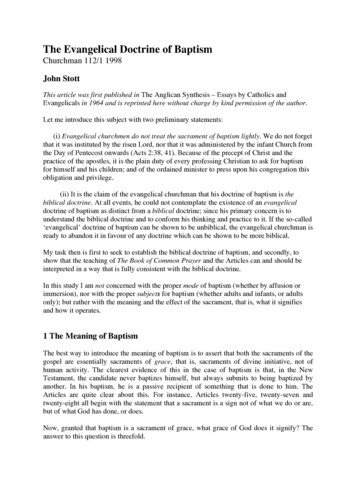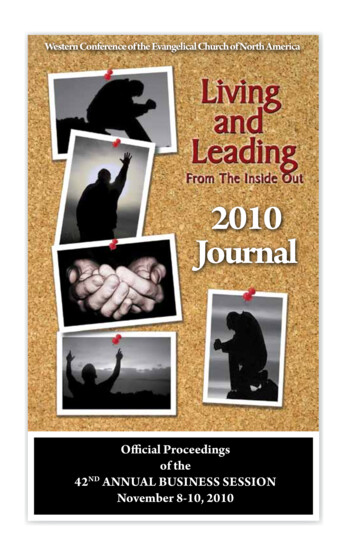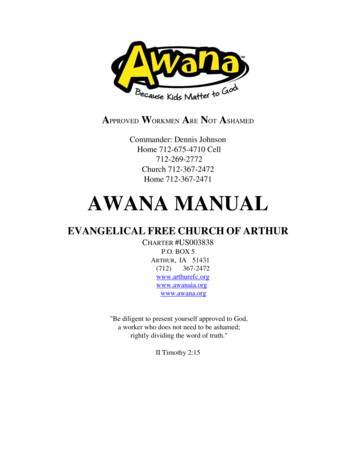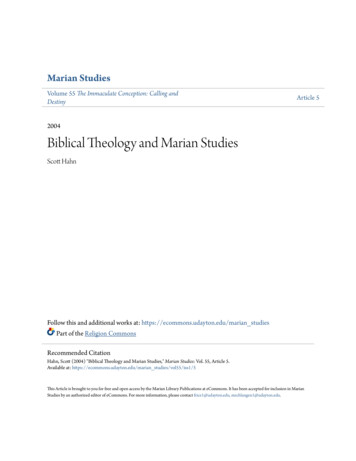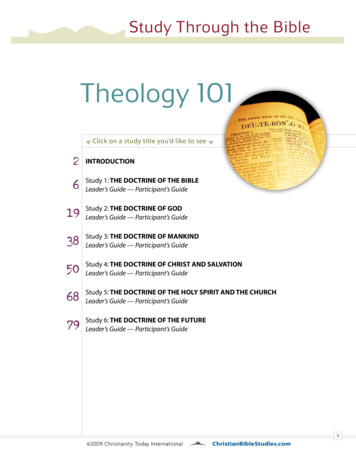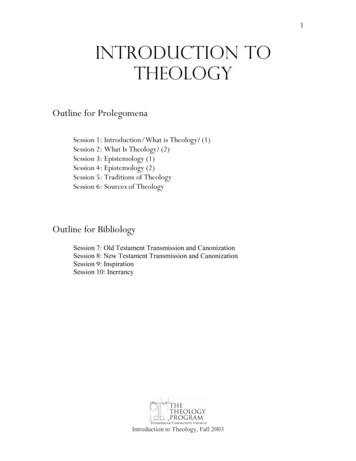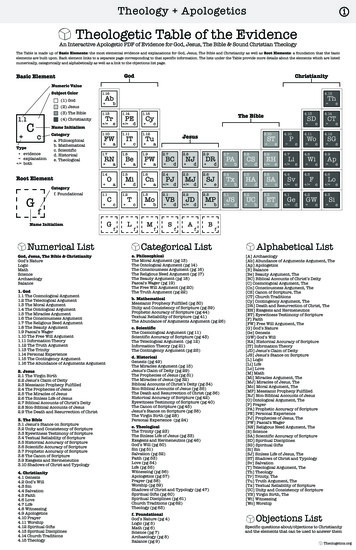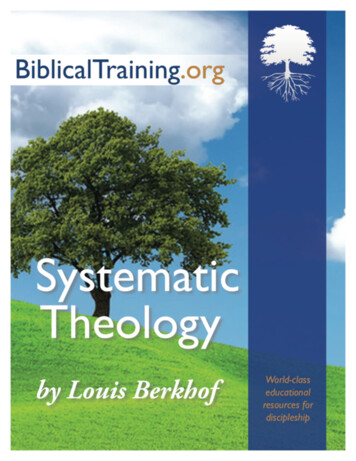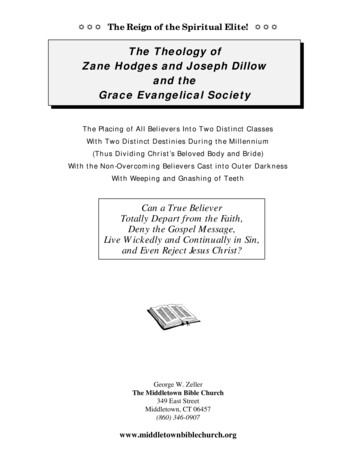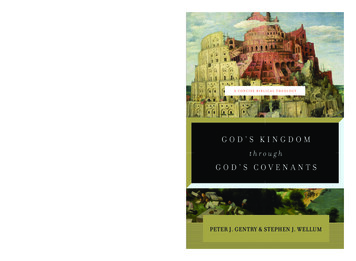
Transcription
ScoTTISHBuLLETINOFEvANGELICALTHEOLOGYVolume 15 Number 1Spring 1997
SCOTTISH BULLETIN OF EVANGELICAL THEOLOGYThe scope of the Bulletin is broadly defined as theology, especially Scottishand Reformed, whether biblical, systematic-dogmatic, historical or practical,and Scottish church history. Articles submitted for publication should be sent tothe Editor, books for review to Rutherford House (see below).Contributors are free to express their own views within the broad parameters ofhistoric Evangelicalism. The opinions of contributors may not be assumed tobe those of Rutherford House or the Scottish Evangelical Theology Society.EDITOR: DAVID F. WRIGHT, Senior Lecturer in Ecclesiastical History, NewCollege, University of Edinburgh, Edinburgh EHl 2LXASSISTANT EDITOR: Dr. EDWARD ADAMS, lrvine, AyrshireREVIEW EDITOR: Dr. DAVID GRAHAM, Lecturer in New Testament and Greek,Glasgow Bible College, GlasgowEDITORIAL BOARD:THE REVD GEOFFREY W. GROGAN, formerly Principal, Bible Training Institute,GlasgowTHE REVD IAN HAMILTON, Newmilns, AyrshireTHE REVD DAVID C. SEARLE, Warden, Rutherford HouseTHE REVD DR. W. CAMPBELL CAMPBELL-JACK, Munlochy, Ross-shireASSOCIATE EDITORS:DR DAVID BEBBINGTON, Reader in History, University of StirlingTHE REVD PROFESSOR SINCLAIR B. FERGUSON, Associate Professor of SystematicTheology, Westminster Theological Seminary, Philadelphia, Penn., USATHE REVD PROFESSOR DOUGLAS F. KELLY, Professor of Systematic Theology,Reformed Theological Seminary, Charlotte, South Carol., USATHE REVD DAVID KINGDON, Theological Books Editor, IVP, LeicesterTHE REVD PROFESSOR DONALD MACLEOD, Professor of Systematic Theology,Free Church of Scotland College, EdinburghPROFESSOR DONALD E. MEEK, Professor of Celtic, University of AberdeenDR KEVIN J. V ANHOOZER, Lecturer in Theology, New College, University ofEdinburghTHE REVD PROFESSOR R. S. WALLACE, Formerly Professor of SystematicTheology, Columbia Theological Seminary, Decatur, Georgia, USAThe Scottish Bulletin of Evangelical Theology is published twice yearly byRutherford House in association with the Scottish Evangelical TheologySociety, whose officers are:.President: Professor I. Howard Marshall, University of AberdeenChairman: The Revd Geoffrey W. OroganSecretary: The Revd Alistair Wilson, 22 School Walk, Elgin, IV30 3ESThe Scottish Bulletin of Evangelical Theology is indexed in Elenchus, Cerdicand/ZBG.Subscriptions should be addressed to: Rutherford House, 17 Claremont Park,Edinburgh EH6 7PJ.Rates: 11.50, students 5.50 Overseas airmail 17.00.ISSN 0265-4539Single issue 7.00
ARTICLES8TESTING THE FOUNDATIONS OF TiffiONOMY ANDRECONSTRUCTIONJ. Esmond Bimie, Queen's University, Belfast27THE MARROW AND THE DRY BONES. OSSIFIEDORTHODOXY AND THE BATTLE FOR Tiffi GOSPEL INEIGHTEENTH -CENTURY SCOTIISH CALVINISMWilliam J.U. Philip, University of Aberdeen38CALVIN, THEOLOGIAN OF THE HOLY SPIRIT: THEHOLY SPIRIT AND THE WORD OF GODAugustusNicodemus Lopes,SemimirioTeol6gicoPresbiteriano Rev. Jose Manoel da Conceicao, Sao Paulo50SURVEYING THE SAINTS: REFLECTIONS ON RECENTWRITINGS ON 'CELTIC CHRISTIANTIY'Donald E. Meek, University of AberdeenBOOK REVIEWS6161636566676869Richard Holloway: Behold Your King! Meditations on theDeath and Resurrection of Christ, by Janet WatsonAlister McGrath: Christian Theology. An Introduction, byRoy KearsleyB.R. Tilghman: An Introduction to the Philosophy ofReligion, by Stephen WilliamsJohn R. May (ed.): Image and Likeness: Religious Visions inAmerican Film Classics, by Steve NolanHans Kiing: Mozart. Traces of Transcendence, by RoyKearsleyKlaus Bockmuehl: Listening to the God who Speaks, byGraham HoustonDavid Brown: The Word To Set You Free. Living Faith awlBiblical Criticism, by Edward AdamsLavinia Byme (ed.):The Hidden Voice. Christian Women arrJSocial Change, by Janet L. Watson
70717273757677787981828485868889899091Douglas A. Campbell: The Rhetoric of Righteousness inRomans 3.21-26, by Edward AdamsMarlene Cohen: The Divided Self: Closing the Gap BetweenBelief and Behaviour, by Brian S. RingroseNeil Elliott: Liberating Paul. The Justice of God and thePolitics of the Apostle, by Edward AdamsB.A. Gerrish: Grace and Gratitude: The Eucharistic Theologyof John Calvin, by David F. WrightRosino Gibellini (ed.): Paths of African Theology, by RoyKearsleyLarry J. Kreitzer: The New Testament in Fiction and Film: OnReversing the Hermeneutical Flow, by Steve NolanEmest Lucas: Science and the New Age Challenge, by HowanlTaylorThomas Manton, edited by Alister McGrath and J.I. Packer:lames, by The Review EditorJ.G. McConville: Judgment and Promise: An Interpretation ofthe Book of Jeremiah, by Edward D. HerbertCharles Hodge, edited by Alister McGrath and J.I. Packer: 1Corinthians and 2 Corinthians, by A.C. BoydLeon Morris: Galatians: Paul's Charter of Christian Freedom,by Alistair I. WilsonJohn Puddefoot: God and the Mind Machine, by HowanlTaylorBrian Rosner (ed.): Understanding Paul's Ethics. TwentiethCentury Approaches, by Edward AdamsKenneth Ross: Gospel Ferment in Malawi: TheologicalEssays, by Howard TaylorJohn Stott: Authentic Christianity, by Charles M. CameronRonald S. Wallace: Calvin's Doctrine of the Word ardSacrament, by D.F. WrightBen Witherington Ill: Paul's Narrative Thought World. TheTapestry of Tragedy and Triumph, by Edward AdamsJohn Wolffe (ed.): Evangelical Faith and Public Zeal:Evangelicals and Society in Britain 1780-1980, by Janet L.WatsonJohn V. Taylor: A Matter of Life and Death, by Gary Badcock
EDITORIAL: THE EVANGELICAL ALLIANCE1846-1996The 150th anniversary of the Evangelical Alliance deserves to be notedby Scottish Evangelicals in particular, for Scots such as ThomasChalmers and Robert S. Candlish were among its most energeticinitiators. The preparatory meeting held at Liverpool in 1845 assembledon the invitation of Scottish Evangelicals, and the fresh spiritualimpulses released by the separation of the Free Church of Scotlandenthused the creation of the Alliance in August 1846.The fortunes of EA have waxed and waned over the decades, but in thelast quarter of the twentieth century it has become a very considerableforce in British, and especially English, Christianity. The Scottish armof the Alliance, which received its own identity and organization in 1992,inevitably experiences the tensions involved in seeking to bedistinctively Scottish while part of a much larger whole whose veryraison d'etre is unity and co-operation.To mark the sesquicentennial, the Evangelical Alliance met inNational Assembly at a watering-place on the south coast, out of whichemerged 'The Bournemouth Declaration':AN EVANGELICAL AGENDAWe, the National Assembly of Evangelicals, meeting inBournemouth, November 11-13th 1996, rejoice in God's grace andpatience, conscious of the privileges we enjoy. We have listened toGod and each other and present this agenda as a reflection of ourdiscussion together.CHRIST, SCRIPTURE AND UNITYWe honour Jesus Christ alone as Saviour and Lord. His atoningdeath, bodily resurrection and personal return are central to Christianfaith.We resolve to proclaim to all the reality of new life through theCross.We confess the Lord Jesus Christ as God's Word incarnate; supremeauthority is his. We recognise scripture as God's word written, thedefinitive, normative and sufficient revelation of God's truth.We repent of our neglect of scripture and resolve to study, live andapply it relevantly in our world.We recognise that unity is both God's gift and God's intention for hispeople. He has made us one in Christ; he wants us to express thatinvisible one-ness in visible ways. We believe that unity becomesvisible primarily through our shared commitment to God's word, toeach other and to his work.We acknowledge our failure to maintain the unity of the Spirit.Our one-ness in Christ requires us to work together with integrity:-
SCOTIISH BULLETIN OF EVANGELICAL THEOLOGY to attempt to distinguish primary from secondary issues and toclarify the extent to which differing terminology can properlyexpress the same truth; to affirm diversity and reach mutual understanding on secondaryissues; to treat each other with love and grace and to live by the spirit ofthe 1846 Evangelical Alliance's 'Practical Resolutions'.CHURCH AND MISSIONMissions begins with God, who calls us to share in reaching theworld with his redeeming love. As Christ was sent by the Father, henow sends us in the power of the Holy Spirit. We recommitourselves to this mission with renewed confidence in the one Godrevealed uniquely in Christ, and in the one gospel to be proclaimed toall people. We believe the Church is the community of faith which iscalled to be an authentic expression of the gospel and a sign of theKingdom of God by: developing missionary congregations of all ages, reaching acrosssocial, linguistic and geographical boundaries; planting radical and creative churches in unreached communities ruxlpeople groups; releasing the vision, zeal and skills of younger leaders; recognising cultural diversity as part of our life and witness in theworld; seeking to engage with the increasing pluralism of our world; rethinking the way we communicate and model gospel truth, loveand reconciliation; receiving from and giving to the worldwide Christian family; preparing for future challenges and opportunities.CHURCH AND SOCIETYGod created and sustains the world, and has given his human creaturesstewardship over all he has made. We recognise that no area of life isoutside God's sovereign rule. We take the incarnation ruxltransforming work of Christ as our model for engagement. We affrrmour commitment to releasing Christian people for involvement at alllevels of society, informed by scripture and enabled by the HolySpirit.We believe it is important for the Church to be a listening people.We acknowledge our common humanity, rooted in the image of God,and our shared responsibility to: uphold and defend the sanctity of human life, and protect ruxlpromote all that contributes to human dignity and development; build and maintain peace and reconciliation between communitiesand peoples in conflict;2
EDITORIAL pursue justice and compassion within our society and the widerworld; promote teaching and training for responsible family living; oppose all forms of racism in Church and society; resist the tendency to marginalise others, and act to break downbarriers of prejudice; promote a positive expression of sexuality, in singleness andmarriage, freeing everyone to develop the rich variety of friendshipsGod intended, as revealed in scripture.CONCLUSIONRecognising our total dependence upon God, we commit ourselves topray and work together to equip and mobilise Christians of all ages inpursuit of this agenda.We repent of our past failures, and pray for reformation and renewal inthe Church and for a spiritual awakening throughout these islands.13 November 1996Not a Doctrinal BasisIt is important not to view this Declaration as a doctrinal platform of theEvangelical Alliance. Its actual Basis of Faith comprises eight doctrinalarticles (on God, Scripture, sin, work of Christ, justification, work of theSpirit, church, return of Christ), prefaced by an introduction which readsas follows:Evangelical Christians accept the revelation of the triune God givenin the Scriptures of the Old and New Testaments and confess thehistoric faith of the Gospel therein set forth. They here assertdoctrines which they regard as crucial to the understanding of thefaith, and which should issue in mutual love, practical Christianservice and evangelistic concern.In general shape it is not unlike the Doctrinal Basis of the Universitiesand Colleges Christian Fellowship (UCCF), which has been widelyadopted by other evangelical bodies.The Alliance's original Doctrinal Basis, approved at the Londonconference in August 1846, had nine articles, briefer, and incorporatingone or two items unlikely to appear in a similar formulation at thepresent time, including 'the Immortality of the Soul'. 'The Right andDuty of Private Judgment in the Interpretation of the Holy Scriptures'was the second clause, after the first on the Scriptures themselves. Itpresumably reflected not so much opposition to the prescriptivemagisterium of the Roman Church as the sensitivities demanded incementing an alliance of diverse Evangelicals in the mid-nineteenthcentury. These are explicitly addressed in three paragraphs that follow thenine clauses but are still part of the Basis of Faith itself.3
SCOTTISH BULLETIN OF EVANGELICAL 1HEOLOGY(i) It is, however, distinctly declared that this brief summary is not tobe regarded, in any formal or ecclesiastical sense, as a creed orconfession, nor the adoption of it as involving an assumption of theright authoritatively to define the limits of Christian brotherhood.(ii) In this Alliance it is also distinctly declared that no compromiseof the views of any member, or sanction of those of others on thepoints wherein they differ, is either required or expected; but that allare held free as before to maintain and advocate their religiousconvictions with due forbearance and brotherly love.(iii) It is not contemplated that this Alliance should assume or aim atthe character of a new ecclesiastical organisation, claiming andexercising the functions of a Christian Church. Its simple andcomprehensive object, it is strongly felt, may be successfullypromoted without interfering with, or disturbing the order of, anybranch of the Christian Church to which its members mayrespectively belong.Practical ResolutionsThe extraordinary care devoted by the founders of the Evangelical Allianceto fostering Christian unity and harmony is also evident in the 'GeneralResolutions' adopted in 1846, which are referred to in the BournemouthDeclaration 150 years later as the 'Practical Resolutions'. It is to thesethat the Declaration itself should be compared, if to any statement fromthe Alliance's early days. Although they are lengthier than the 1996Declaration, they bear reproduction here, not least because their substancederived from an important address by Thomas Chalmers and because theywere read and emphasized at successive general conferences of theAlliance.1. That the Members of this Alliance earnestly and affectionatelyrecommend to each other in their own conduct, and particularly intheir own use of the press, carefully to abstain from and put away allbitterness, and wrath, and anger, and clamour, and evil-speaking, withall malice; and, in all things in which they may yet differ from eachother, to be kind, tender-hearted, forbearing one another in love,forgiving one another, even as God, for Christ's sake, bath forgiventhem; in everything seeking to be followers of God, as dear children,and to walk in love, as Christ also bath loved them.2. That, as the Christian Union which this Alliance desires topromote can only be obtained through the blessed energy of the HolySpirit, it be recommended to the Members present, and absentbrethren, to make this matter the subject of simultaneous weeklypetition at the throne of grace, in their closets and families; and theforenoon of Monday is suggested as the time for that purpose. Amthat it be further recommended, that the week beginning with the first4
EDITORIALLord's day of January, in each year, be observed by the members andfriends of the Alliance throughout the world, as a season for concertin prayer on behalf of the grand objects contemplated by the Alliance.3. That, in seeking the correction of what the members of theAlliance believe to be wrong in others, they desire, in humbledependence on the grace of God, themselves to obey, and by theirpractice and influence to impress upon others, the command ofChrist, to consider first the beam that is in their own eye: that theywill, therefore, strive to promote, each in his own communion, aspirit of repentance and humiliation for its peculiar sins; and toexercise a double measure of forbearance in reproving, where reproofis needful, the faults of those Christian Brethren who belong to otherbodies than their own.4. That, when required by conscience to assert or defend any viewsor principles wherein they differ from Christian Brethren who agreewith them in vital truths, the members of this Alliance will aimearnestly, by the help of the Holy Spirit, to avoid all rash andgroundless insinuations, personal imputations, or irritating allusions,and to maintain the meekness and gentleness of Christ by speakingthe truth only in love.5. That, while they believe it highly desirable that Christians ofdifferent bodies, holding the Head, should own each other as Brethrenby some such means as the Evangelical Alliance affords, theMembers of the Alliance disclaim the thought, that those only whoopenly join this Society are sincere friends to the cause of ChristianUnion; that, on the contrary, they regard all those as its true friendswho solemnly purpose in their hearts, and fulfil that purpose in theirpractice, to be more watchful in future against occasions of strife,more tender and charitable towards Christians from whom they differ,and more constant in prayer for the union of all the true disciples ofChrist.6. That the members of this Alliance would therefore invite,humbly and earnestly, all Ministers of the Gospel, all conductors ofreligious publications, and others who have influence in variousbodies of Christians, to watch more than ever against sins· of theheart, or the tongue, or the pen, towards Christians of otherdenominations; and to promote more zealously than hitherto a spiritof peace, unity, and godly love, among all true believers in the LordJesus Christ.7. That, since all the disciples of Christ are commanded by theHoly Spirit to add to brotherly kindness, love, and are bound to praythat all who profess and call themselves Christians should be led intothe way of truth; it is earnestly recommended to the Members of theEvangelical Alliance, to offer special prayer for all merely nominalChristians, as well as for Jews and Gentiles throughout the world.5
SCOTTISH BULLETIN OF EVANGELICAL THEOLOGY8. That the Members of this Alliance, earnestly longing for theuniversal spread of Christ's kingdom, devoutly praise God for thegrace whereby, in late years, Evangelical Christians have been movedto manifold efforts to make the Saviour known to both Jew arrlGentile, and faithful men have been raised up to undertake the toil.They would offer to all Evangelical Missionaries their most fraternalcongratulations and sympathy; would hail the flocks they have beenhonoured to gather, as welcome and beloved members of thehousehold of God; and above all, would implore the Head of theChurch to shield his servants, to edify his rising churches, and, by theoutpouring of his Holy Spirit, to enlighten Israel with the knowledgeof the true Messiah, and to bring the Heathen out of darkness intolight. They would also record their confident hope, that their belovedMissionary Brethren will strive more and more to manifest, before theIsraelite and other classes who know not the Redeemer, that union intheir blessed Lord, the spirit of which, the Members of this Alliancewould gratefully acknowledge, they have generally cherished.Evangelical Unity and the Evangelical AllianceIt was Chalmers' concern that the new Alliance should not find itself aunion without a job to do. What may surprise present-day Evangelicals isthat the great task he identified for it was simply the promotion ofChristian unity. There is much in these Practical Resolutions that theevangelical community today should take seriously to heart, if it is inearnest in still regarding evangelical unity as a goal worth pursuing.Unity features with Christ and Scripture in the first section of theBournemouth Declaration, but even if allowance is made for its brevity,it falls far short of the studied application of the Practical Resolutions'commitment to this grand obje
Reformed Theological Seminary, Charlotte, South Carol., USA THE REVD DAVID KINGDON, Theological Books Editor, IVP, Leicester THE REVD PROFESSOR DONALD MACLEOD, Professor of Systematic Theology, Free Church of Scotland College, Edinburgh PROFESSOR DO
